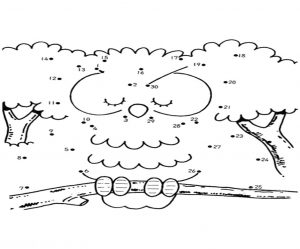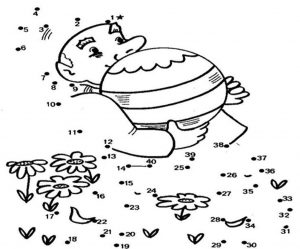
Do you want to improve your ability of doing more than one action at a time? Dual Task training program is there to help with the enhancement of the ability of divided attention and to achieve the reaction with multiple stimuli or works. This game can be played with any number of players. During this exercises the participants will be invited to share their attention simultaneously on both tasks at the same time. It is a wonderful opportunity to test and exercise your attention and your memory.
Basic information
Definition
Dual task is a Cognitive Training Intervention with a great variety of tasks. The main aim of the Dual Task training program is the enhancement of the ability of divided attention, which is defined as the ability during which the shift of attention to multiple stimuli or tasks is achieved, so that the participants can do more than one action at a time. It is related to an increasing cognitive requirement, which reflects the accuracy and speed of reaction.
Dual-task skills can be substantially improved in older adults and that cognitive plasticity in attentional control is still possible in old age. The tasks are ecological because they are recruited from the patient’s daily life.
Objectives
During this exercises the participants will be invited to share their attention simultaneously on both tasks. The tasks use different processing networks such as visual-kinetic, verbal-motor, and speech stimuli. The intervention of dual task is separated in 2 levels. The “Primary task” which is simpler than “Secondary task”, so there is a hedge between the two tasks in order not to exceed the mental capacity of the participants in the group to perform both tasks at the same time.
This game can be very good to improve the following cognitive dimensions:
- Working memory,
- Shared attention,
- Processing speed,
- Executive function.
Duration
Duration depends on the level of difficulty. One task (game) will be normally between 20 to 30 minutes. This can be enlarged adding additional rules or incentives.
Cost:
Free
Reference
- http://dx.doi.org/10.1080/03610730802070068
- Holtzer, R., Stern, Y., & Rakitin, B. C. (2005). Predicting age-related dual-task effects with individual differences on neuropsychological tests. Neuropsychology, 19(1), 18
- Kirova, A. M., Bays, R. B., & Lagalwar, S. (2015). Working memory and executive function decline across normal aging, mild cognitive impairment, and Alzheimer’s disease. BioMed research international, 2015.
Development
Participants
Participants’ profile:
- Dementia level: game can be administered only to people with mild cognitive impairment.
- Physical requirements: Not high in general. For highly limited users, the game can be played using an assistant that show to the user the instructions. Good functionality at arms and hands.
- Number of participants: This game can be played with any number of players (better more than 3 people). Also, it can be played individually.
Material and requirements
Materials needed to develop the game:
- In general: a table and a chair are important for this activity.
- Technical materials: radio, cards with colors, coins, shapes and numbers, balls, wands, rings, cones.
- Environment considerations: Good lighting levels. Not very noisy room.
Support needed
Professionals / relatives can:
- Explain the instructions of the game and their variants
- Give clear advices during the game.
- Supervise the correct development of the game.
- Encouraging attitude that provides comfort to players.
- Change the level of the game, if it is too difficult.
Starting point:
Prepare the technical materials (e.g. cards with colors). Explain the instructions by performing an example. Start with the single condition.
Development:
Here is an example of one visual and verbal active movement exercise:
This exercise involves 1 visual task, 1 motor response and 1 verbal task.
Α. Single condition
- Categorize the colorful cards which are on the desk, according to their color.
- Listen to “this” song and count how many times the singer repeats “the specific phrase (example)”. How many times did you hear it?
Β. Dual task
1 +2) Listen to “a different from the previous” song and count how many times the singer repeats “the specific phrase (example)”. You also have to categorize the colorful cards which are on the desk, according to their color. You have to do it parallel. Pay the same attention to both of the tasks.
How many times did you hear the specific word/phrase of the song?
Did you categorize the correct colors cards?
Additional information
Variants of the game:
The intervention has tasks with an increasing degree of difficulty varying according to the baseline cognitive and kinetic performance of the participants.
Additional and different rules can be added, or even playing this game in combination with another. Another 2 examples are:
1st Game
Α. Single condition
1) Join the numbered dots in ascending order to create the image. Complete the exercise as soon as possible.
2) You need to say the Alphabet (ABC) for one time, the sooner you can.
B. Dual task
1 +2) Join the numbered dots in ascending order to create the image, while you are saying the alphabet (ABC). If the alphabet is over, you have to restart from the begin. The exercise is completed when the picture is formed. Remember that it is necessary to do both tasks at the same time. Complete the exercise as soon as possible. Pay the same attention both two tasks.
2nd Game
Α. Single condition
1) You have to walk along the room, on the line formed with colored tape, while holding a spoon with your hand with a ball on it. You need to walk on the line front and back for seven times. Then the exercise is completed. You must try not to drop the ball from the spoon while you are walking.
2) You have to say the months of the year, starting from January, as soon as you can.
B. Dual task
1 +2) You have to walk along the room, on the line which is formed by a tape, while holding a spoon with your hand with a ball on it. You need to walk on the line front and back for seven times. At the same time, you need to say the months of the year, starting from January. Remember that, it is necessary to do both tasks at the same time, the sooner you can. The exercise is completed, when you finish walking. Pay the same attention both two tasks.
Alternative games:
Similar AD-GAMING games:
Assessment:
- Time needed to perform the game
- Number of mistakes
- Help needed
- The combination of the 2 tasks
Practical activity
- Prepare the materials (radio, cards with colors, coins, shapes and numbers, balls, wands, rings, cones)
- Professional/family gives a brief explanation
- Ask for any questions/doubts
- Start the game with the single condition. Let them play
- Continue with the second condition/ exercise and let them play separately.
- Explain that they will do them together and they will have to answer at special questions
- Do the dual task
- Observe what’s happening, if players need help to follow the instructions, you can guide them.
- Ask them the questions
- Assessment
![]()





